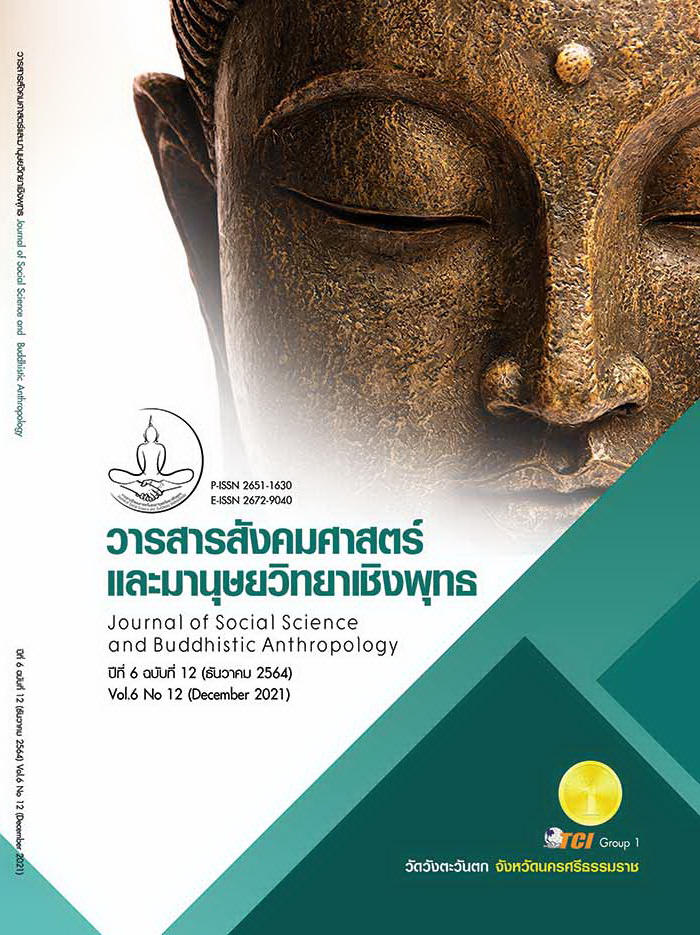THE INNOVATION AND ADMINISTRATIVE TECHNOLOGY TO PROMOTE GOOD GOVERNANCE OF LOCAL ADMINISTRATIVE ORGANIZATIONS IN THE NEXT DECADE
Keywords:
Innovation, Administrative Technology, Good Governance, Local Administrative Organizations, The Next DecadeAbstract
The objective of this research is to present an innovative model and management technology to promote good governance of the local government organizations (LGOs) in the next decade by combining both quantitative research and qualitative research with the use of research tool consisting of a questionnaire for 420 people. It was found that the overall level of opinions on innovation and administrative technology to promote good governance of the LGOs at present was at a high level. In the phase of qualitative research, the EDFR technique which is an in-depth interview and answering of a closed-ended questionnaire obtained by synthesizing data from the interview with key informant from the executives of LGOs and qualified government administration and 24 related people was used for 3 times until a consensus was reached. The researchers whereupon performed a futuristic scene synthesis of the task management system of LGOs that should be developed, improved, changed to be up-to-date as much as the future situation. There should be a system of relationship between LGOs in all 3 main groups, namely administration, service and support with the application of innovative management systems, the use of administrative technology, the development of a high-performance organization with good governance. The important conclusions as a scene of the future of the LGOs at all levels are 1) LGO is a state-owned organization that is a modern monarchy in the community; 2) LGO is a good governance organization for the community; 3)LGO is a community management innovation organization; 4) LGO is an organization of community management technology; 5) LGO is a high-performance community organization and 6) LGO is an excellent community service organization. The data collection period was from October 2020 to September 2021.
References
ทองคำ ดวงขันเพ็ชร, อภิวัฒชัย พุทธจร, และสมพงษ์ เกษานุช . (2562).การพัฒนาศักยภาพของชุมชนและองค์การปกครองส่วนท้องถิ่นในการส่งเสริม การท่องเที่ยวทางพระพุทธศาสนาและวัฒนธรรมไทย-ลาว. วารสารศิลปศาสตร์ราชมงคลสุวรรณภูมิ, 2 (3), 504-514.
พระราชกฤษฎีกาว่าด้วยหลักเกณฑ์และวิธีการบริหารกิจการบ้านเมืองที่ดี พ.ศ 2546. (2546). ราชกิจจานุเบกษา เล่ม 120 ตอนที่ 100 ก หน้า 1-16 ( 9 ตุลาคม 2546)
สมพงษ์ เกษานุช, ธนู ทดแทนคุณ, เบญจรงค์ พื้นสะอาด . (2562).บทบาทผู้นำกับกระบวนทัศน์ในการพัฒนาชุมชน. วารสารศิลปศาสตร์ราชมงคลสุวรรณภูมิ, 1(3), 293-306.
สัมพันธ์ สุกใส. (2563). ระบบการมีส่วนร่วมการจัดการขยะในชุมชนเชิงบูรณาการเขตพื้นที่จังหวัดภาคกลาง วารสารศิลปศาสตร์ราชมงคลสุวรรณภูมิ, 2 (3), 515-528
สำนักงานคณะกรรมการการศึกษาแห่งชาติ, (2545 ). ภาพอนาคตและกลยุทธ์: เราจะ ใช้ ICT เพื่อสนับสนุนการปฏิรูปการเรียนรู้ในโรงเรียนได้อย่างไร. รายงานการประชุมปฏิบัติการ. กรงุเทพมหานคร : สกศ.
สำนักงานปลัดกระทรวงมหาดไทย. (2564). แผนการบริหารทรัพยากรบุคคล สำนักงานปลัดกระทรวงมหาดไทย พ.ศ.2560-2564. เรียกใช้เมื่อ 3 มีนาคม 2564 จาก http://www.personnel.moi.go.th/manpower/2560/hrmplan.pdf
อภิษฎาข์ ศรีเครือดง ,นภัทร์ แก้วนาค ,ธนู ทดแทนคุณ ,ลัดดา แพรภัทรพิศุทธิ์. (2563). รูปแบบการเสริมสร้างการมีส่วนร่วมในการส่งเสริมความโปร่งใสขององค์กรปกครองส่วนท้องถิ่นไทยในทศวรรษหน้า.
วารสารศิลปศาสตร์ราชมงคลสุวรรณภูมิ, 2 (1), 341-356.
Macmillan, T. T. (1971). The Delphi Technique. Paper Presented at the annual meeting of the California Junior Colleges Associations Committee on Research and Development, Monterey, California. (May 1971), 3-5.
Taro Yamane. (1970). Determining sample size for research activities. Educational and Psychological Measurement, 30(3), 607 - 610.









